It's National Volunteer Week
It's National Volunteer Week so time to celebrate and thank our awesome volunteers by showing off what they've been up to.
Volunteer of the Year
MVIHES has started something new this year and that is selecting a Volunteer of the Year. Our selection is not based solely on charm, wit and style (although our volunteers do have charm, wit and style) but on their participation in our projects and going the extra mile for salmon. This year's volunteer is...drum roll please.....
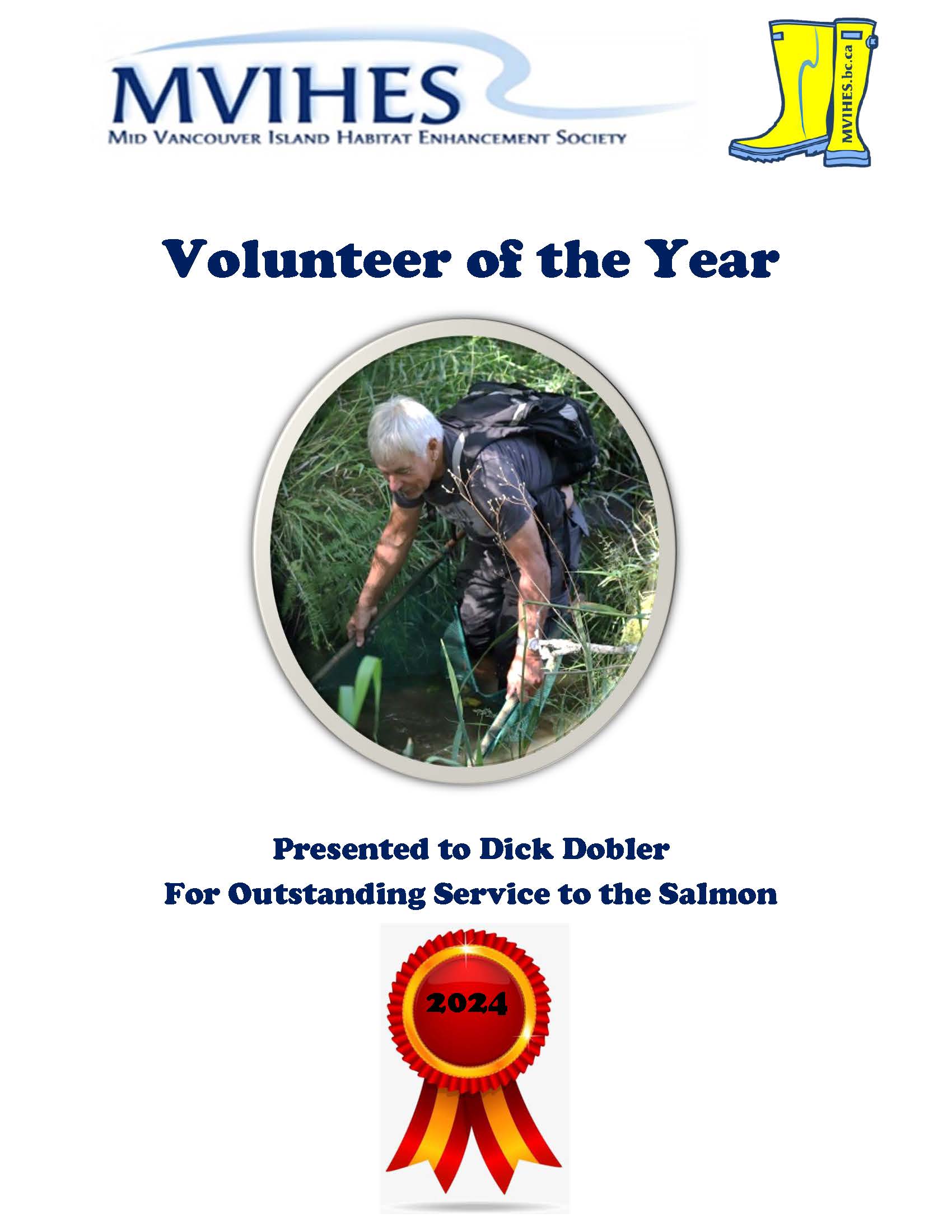
Dick not only participates in most of our activities, he rescues fry trapped in small isolated pools in creeks and rivers and behind beaver dams. He also helps with the maintenance of the Englishman River Regional Park, all with a cheerful and positive attitude. Congratulations Dick!
Annual Smolt Count
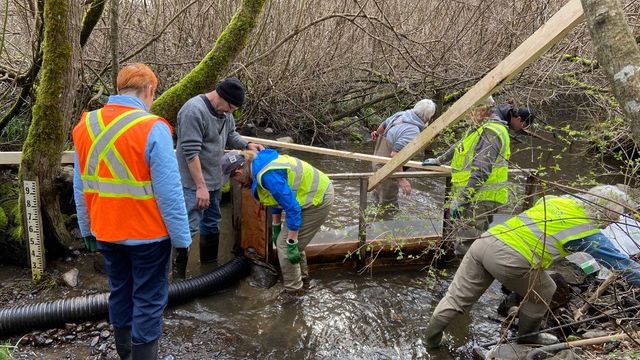 MVIHES volunteers and the BC Conservation Foundation (BCCF) were busy on March 25 installing the smolt trap for our annual count of coho salmon smolts as they migrate out of Shelly Creek into the Englishman River on their way to the ocean. Coho smolts, along with a few trout, are corralled by the smolt fence and directed through a pipe (seen in the left-hand photo) into a large metal box.
MVIHES volunteers and the BC Conservation Foundation (BCCF) were busy on March 25 installing the smolt trap for our annual count of coho salmon smolts as they migrate out of Shelly Creek into the Englishman River on their way to the ocean. Coho smolts, along with a few trout, are corralled by the smolt fence and directed through a pipe (seen in the left-hand photo) into a large metal box.
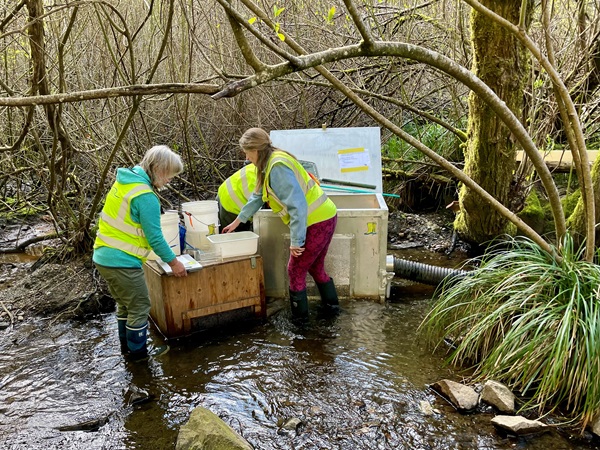
Every morning at 9 am our volunteers open the smolt box (seen in the right-hand photo) to count all the fish and measure some of the salmon and trout before releasing them back into the creek. We've caught over 400 coho smolts, 16 rainbow trout, and 8 cutthroat trout so far. Water temperatures are still pretty cool (below 8 degrees C most days) so we anticipate the peak of the migration is yet to come. One year we counted almost 9000 smolts.
A great blue heron and a river otter are regular visitors to Martindale Pond (a wetland in Shelly Creek just upstream of the smolt fence). One morning a pair of common mergansers was also partaking in the smorgasbord. The fish better get a move on before they're all eaten. The regular presence of predators is a good indicator that Shelly Creek is a productive salmon creek.
The lengths of the smolts average around 9 cm while some of the trout have been much bigger. So far, we've measured rainbow trout up to 19.8 cm long and cutthroats up to 26 cm! And, we caught a fish that BCCF believes is a hybrid between a cutthroat and a rainbow trout (seen in the right-hand photo below). A cutbow! How cool is that? BCCF is PIT tagging the salmon smolts and trout caught in our smolt box again this year for the Salish Sea Survival Study. A few of our volunteers on the smolt count are in the left-hand photo below.
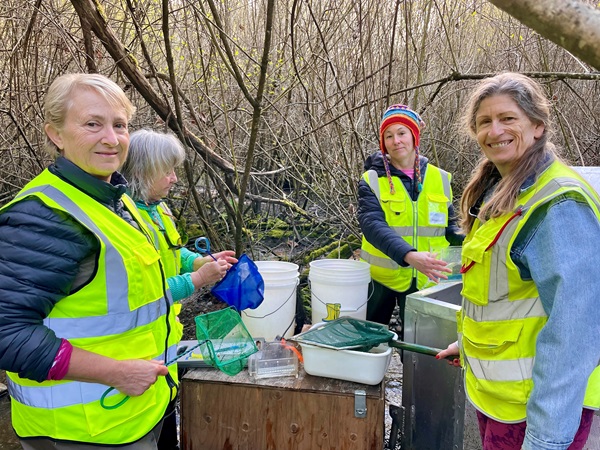
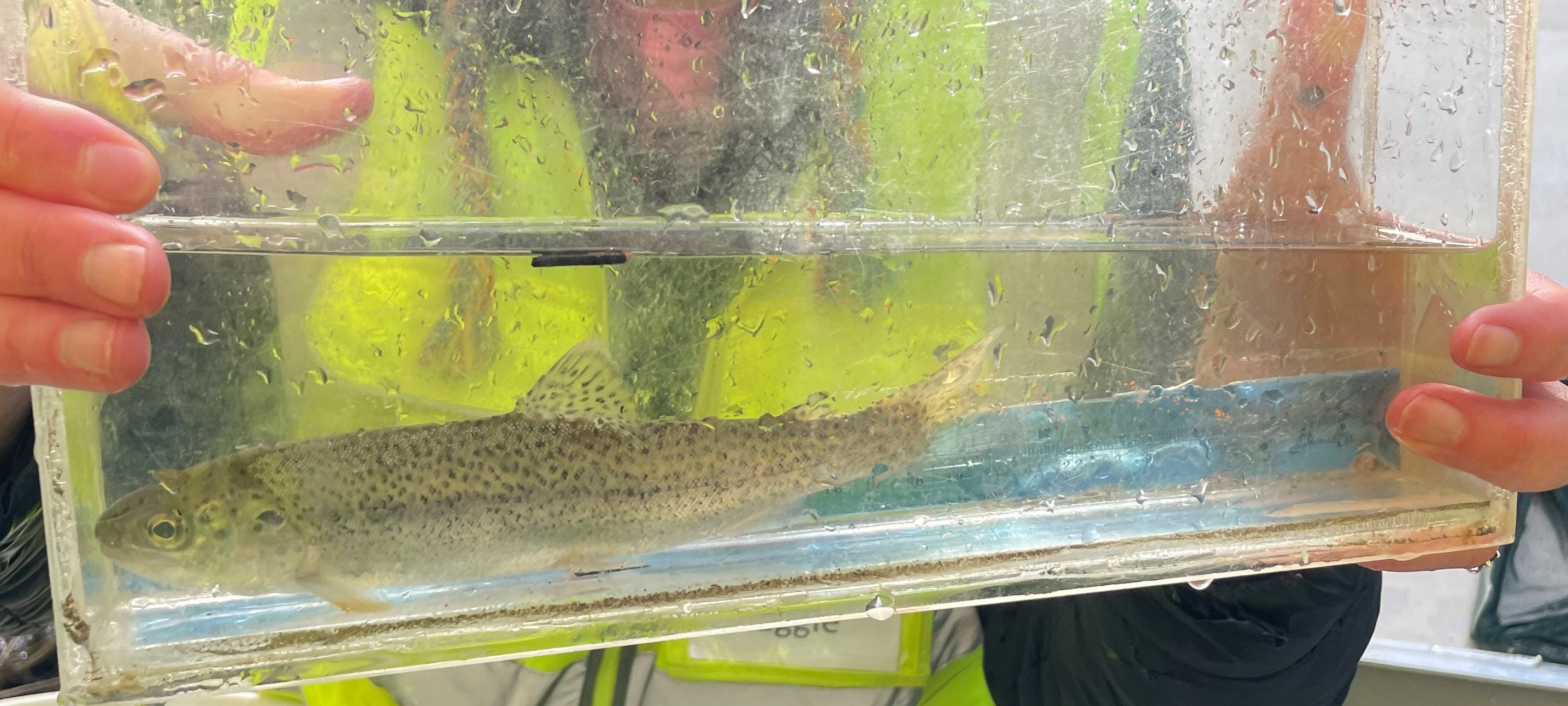
l. to r. Cathy Kuntz, Jo McIlveen, Maggie Estok, Shelley Goertzen. Photos taken by Sue Wilson
Other volunteers involved with the smolt count are: Jeff Allen, Gord Armbruster, Terry Baum, Marilyn Bilsbarrow, Denis Cote, Dick Dobler, Carmel Lowe, Barb Riordan, Barbara Wildman-Spencer and Bob Williams. Thanks to Ally Badger and Thomas Negrin of BCCF for assisting in the installtion of the smolt trap and PIT tagging our fish.
If you would like to join the fun and count coho smolts with us, you can sign up here or send an email to Shelley at This email address is being protected from spambots. You need JavaScript enabled to view it.
The Parksville Rain Garden Receives Some TLC
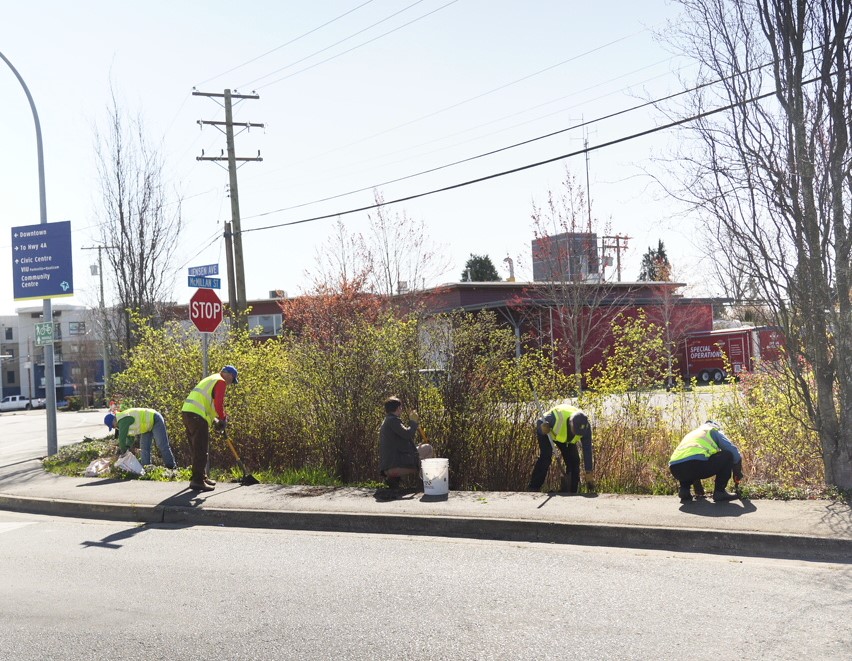
On April 13, nine volunteers led by Team Leader, Bob Williams, descended on the Parksville Raingarden at the Firehall to give it some much needed weeding and pruning (left-hand photo). You may already know that rain gardens provide an important service to salmon. Rainwater that runs off roofs, driveways, parking lots, and roads picks up pollutants such as oil, detergents from powerwashing, moss-controlling chemicals from roofs, weedkiller, and litter (plastics) before flowing into stormwater drains and storm sewers which empty directly into creeks, rivers and the ocean.
This rainwater doesn't get a chance to soak into the ground and add to the groundwater that provides flow to creeks and rivers during the dry months of summer. Rain gardens are designed to intercept rainfall runoff and filter out pollutants while allowing the water to infiltrate the ground.
The Parksville Rain Garden was constructed in 2012 under a partnership between MVIHES and the City of Parksville. The rain garden mitigates rainfall runoff from the the Firehall parking lot. MVIHES has been maintaining the vegetation in the rain garden since 2021.
The photos below were taken by our Social Media Co-ordinator, Polina Iudina, and show our volunteers in action. MLA Adam Walker, in the middle photo below, joined us and got down to work. Himalayan blackberry, ivy, and weeds were removed while bald-hipped rose, red-osier dogwood and red currant were pruned back. Many thanks to the City of Parksville for hauling away all the trimmings.
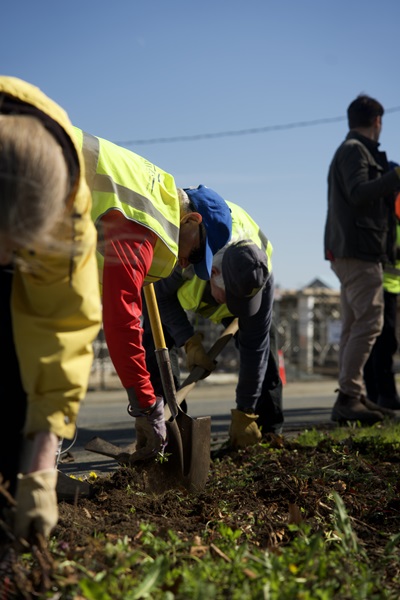
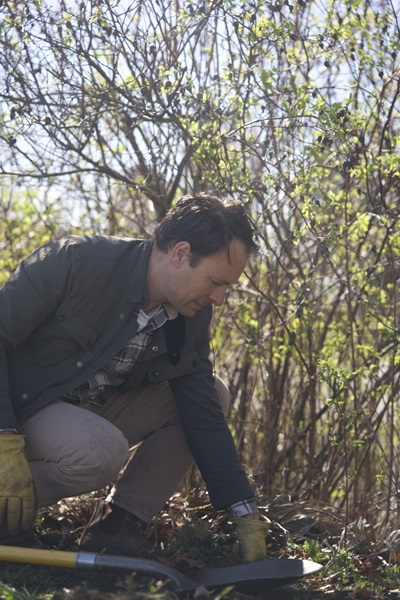


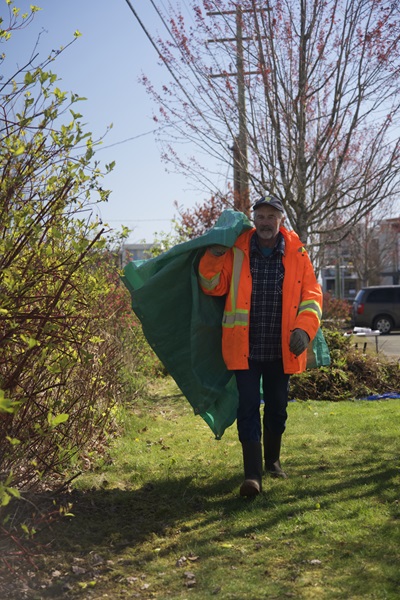
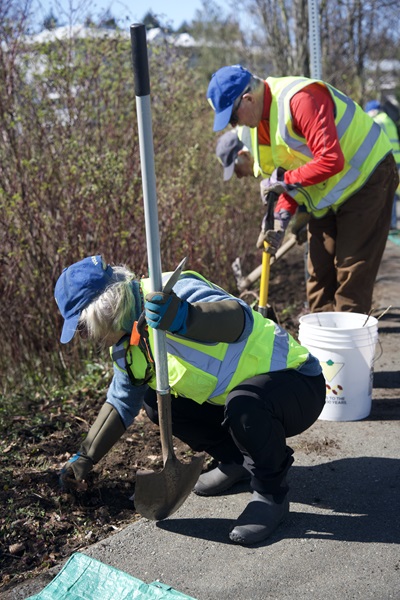
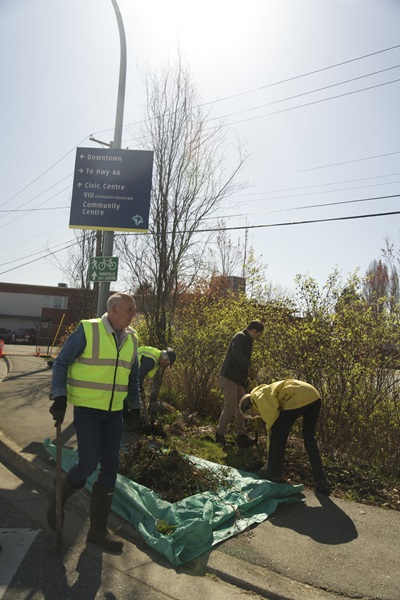
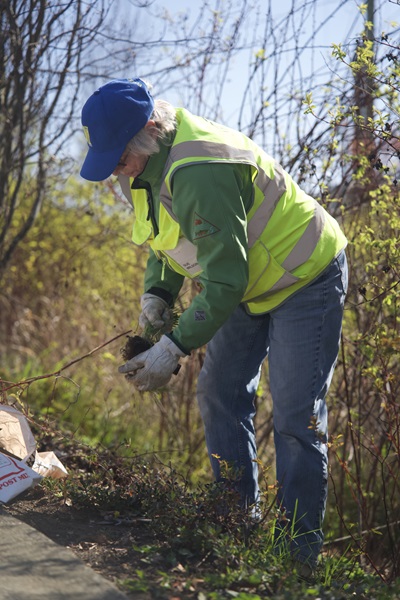
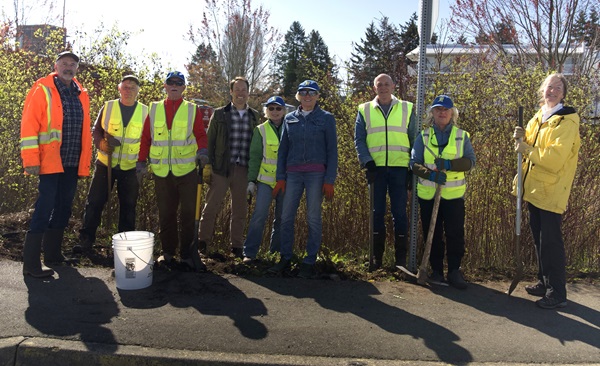 From l. to r. Bob Williams, Dick Dobler, Doug Herchmer, Adam Walker, Sue Wilson, Brenda Riley, Gord Almond, Jo McIlveen, Cathy Hemlen, absent Yana Maltais
From l. to r. Bob Williams, Dick Dobler, Doug Herchmer, Adam Walker, Sue Wilson, Brenda Riley, Gord Almond, Jo McIlveen, Cathy Hemlen, absent Yana Maltais
You can watch a video with an explanation about rain gardens by Bob and Adam here.
Friends of Shelly Creek Park Invasive Plants Removal
Thanks to Sue Wilson and her dedicated volunteers, along with Warren Payne, City Parks Supervisor, loads of invasive species such as lamium (yellow archangel) and Himalayan blackberry are being eradicated from Shelly Creek Park. The park is home to a resident Coastal Cutthroat Trout population, a blue-listed species of concern in BC. By removing invasive species and replacing them with native plants, they are maintaining the health of the forest ecosysytem that protects and nourishes Shelly Creek and the trout. This work has been ongoing since 2022.
The photo below shows a few of the many volunteers surveying the big pile of Himalayan blackberry canes that were cut in March. More canes were cut on April 10, when the photo was taken, which the City of Parksville will be hauling away.
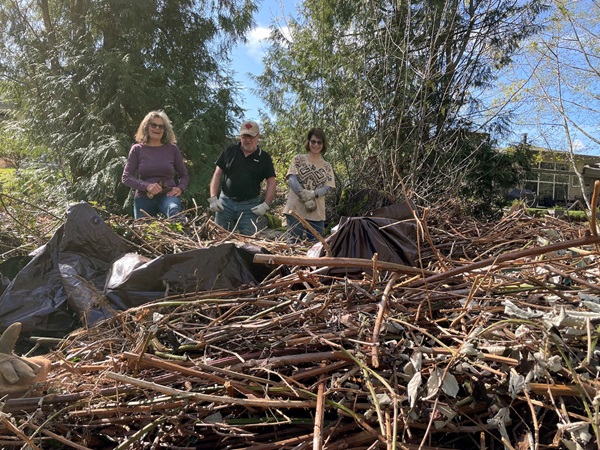 l.to r. Gene Gapsis, Del Rokosh, Nancy Pezel
l.to r. Gene Gapsis, Del Rokosh, Nancy Pezel
A City worker expertly removed a very dense patch of blackberry at the park entrance with a backhoe, leaving native shrubs intact, shown in the photo below. Well done and thank you to the volunteers and the City.
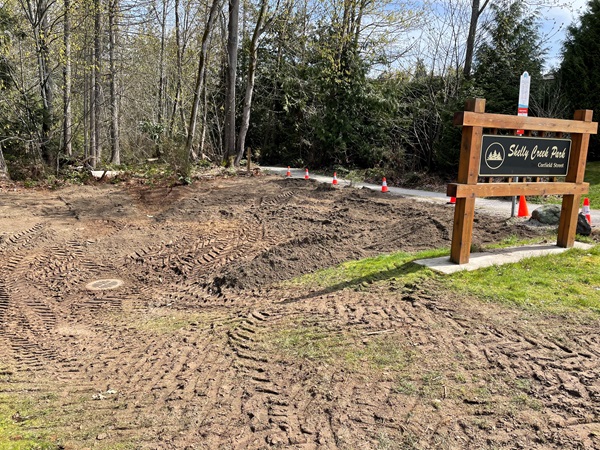
You can follow the activities of the Friends of Shelly Creek Park here.
WE ARE SO THANKFUL FOR ALL THE GREAT VOLUNTEERS MAKING A DIFFERENCE FOR SALMON!